Over the past two years, Sporting Portugal fans have anxiously awaited the day one of Europe’s elite teams would sign their midfield maestro, Bruno Fernandes. When the 2018 Alcochete training ground attacks led to a mass exodus of Sporting’s top talent, Fernandes remained with the club, taking the captain’s armband and his natural role as the leader of the team.
After a 2018/19 campaign that saw him break Frank Lampard’s single-season record by goals from a midfielder, a move seemed imminent. Manchester United was said to have a great interest in the player, but a bid never materialised. Tottenham wanted him too, agreeing to a contract with Fernandes only to see Sporting reject their bid.
As the transfer rumours circulated, a leaked story claims Manchester United were never seriously pursuing Fernandes. With his Portuguese Primeira Liga passing percentage lingering around 75%, Manchester United worried about his turnover tendencies. English newspapers claimed that scouts could not recommend signing Fernandes because his tendency to play the spectacular pass would not fit within Ole Gunnar Solskjær’s tactical philosophy.
So far in the 2019/20 season, Fernandes is repeating his incredible 2018/19 numbers with Sporting. His presence with the Portuguese national team is increasing too, both in the regularity of his playing time and his significance within Fernando Santos’ tactics. His national team colleague, Cristiano Ronaldo, shared his surprise at Fernandes’ lack of transfer movement, saying “In the national team, you have [Joao] Cancelo, Fernandes, who nobody knows why he doesn’t leave [Sporting].”
With Manchester United and Tottenham struggling to score goals and the January transfer window nearly upon us, the rumour mill is again circling the José Alvalade Stadium. José Mourinho’s hire at Tottenham has only fanned the flames of a transfer.
In this tactical analysis, we’ll dive deep into Fernandes’ statistics, playing responsibilities and playing style. The objective of this scout report is to look beyond the “his passing completion percentage is too low” myth and show how he solves the attacking issues at Manchester United and Tottenham. After passing on Fernandes last summer, we’ll examine whether either team can afford to pass on him in January.
Key Passes
As the transfer rumour swirled last summer, the football world wondered when, not if, Fernandes was leaving. Manchester United’s reluctance to table a bid due to Fernandes’ pass completion percentage was a surprising revelation. For a team that desperately needed an attacking central midfielder to complement Paul Pogba’s creative passing, this move seemed like the perfect fit.
If passing percentage is the most significant measure of fit at Manchester United, then refusal to bid is justified. 75.1% is not an impressive number. It’s said that United acknowledged central attacking midfielders will typically have a lower pass completion percentage than the other positions due to the creative, direct nature of their passes.
When analysing a player’s turnovers, it’s important to gauge the impact of the turnover, including the chances created for the opposition and lost opportunities for the attacking team. In his own half and without numbers behind him, Fernandes plays a very simple passing game. Managing risk is the key. When he turns the ball over, it’s typically in a low risk, high reward scenario.
As his team progresses up the field, Fernandes transitions into playmaker mode, especially with Sporting. In the summer of 2018, Sporting lost several key players to voided contracts or underwhelming sales, including William Carvalho, Gelson Martins and Rui Patricio. Promising young attackers Daniel Podence and Rafael Leão left too. That left Sporting with a depleted squad and few assets. As those players left, the burden fell squarely on Fernandes’ shoulders.
As Sporting continues to recover from the training ground disaster, they’ve had to rely primarily on lower-rated academy products, veteran castoffs and low-cost place holders. When he plays for Sporting, Fernandes doesn’t take risks because he’s reckless or unaware of possible negative outcomes. He takes those risks because he’s the lone elite player on the team. Without him in the lineup, Sporting lost to minnows Famalicão and was largely outplayed at home.
Playing for the Portuguese national team is a different story. With the immense quality around him, Fernandes plays a more defined, calculated role. His pass completion percentage improves, but he drops in the key passes category. During the UEFA Nations League, his recorded stats of 80% and 2 respectively. Those two key passes per game equal Pogba’s Manchester United tally in the current season, which is easily tops on the team.
Since his supporting cast with the Portuguese national team offers a better comparison to Manchester United and Tottenham, it’s fitting to look at examples of his play with that squad. It must be noted that he started slowly for Portugal, but, as he learns his teammate’s tendencies (which is especially key for the creative playmakers) and adapts to their level of play, he’s quickly growing in influence and putting in excellent performances.
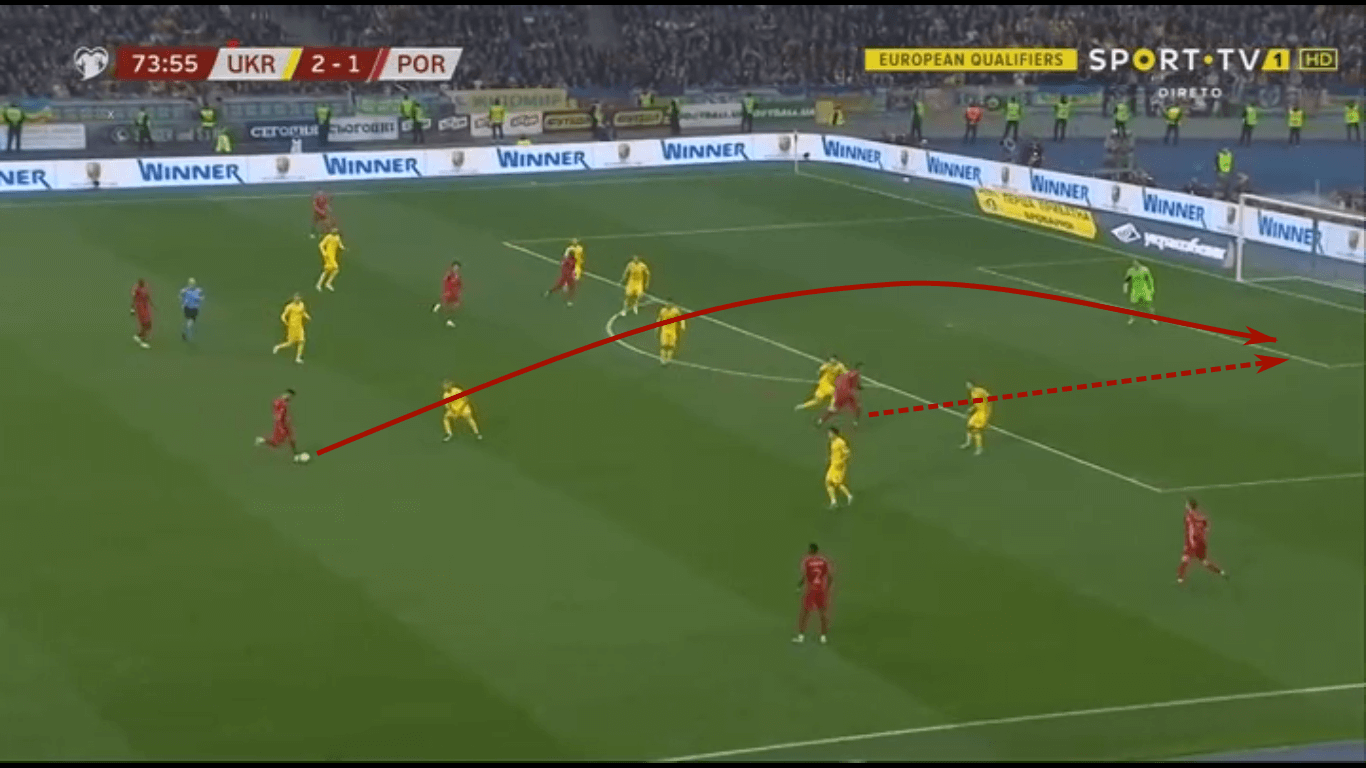
With Ukraine committing 10 players to defend behind the ball within 24 metres of the goal, Fernandes astutely drops deeper. This additional space allows him to better perceive his options and look for a way through the defence. As he receives the ball, Ronaldo darts behind his defender. Fernandes anticipates the run and drops a mouth-watering lofted pass to the near post.
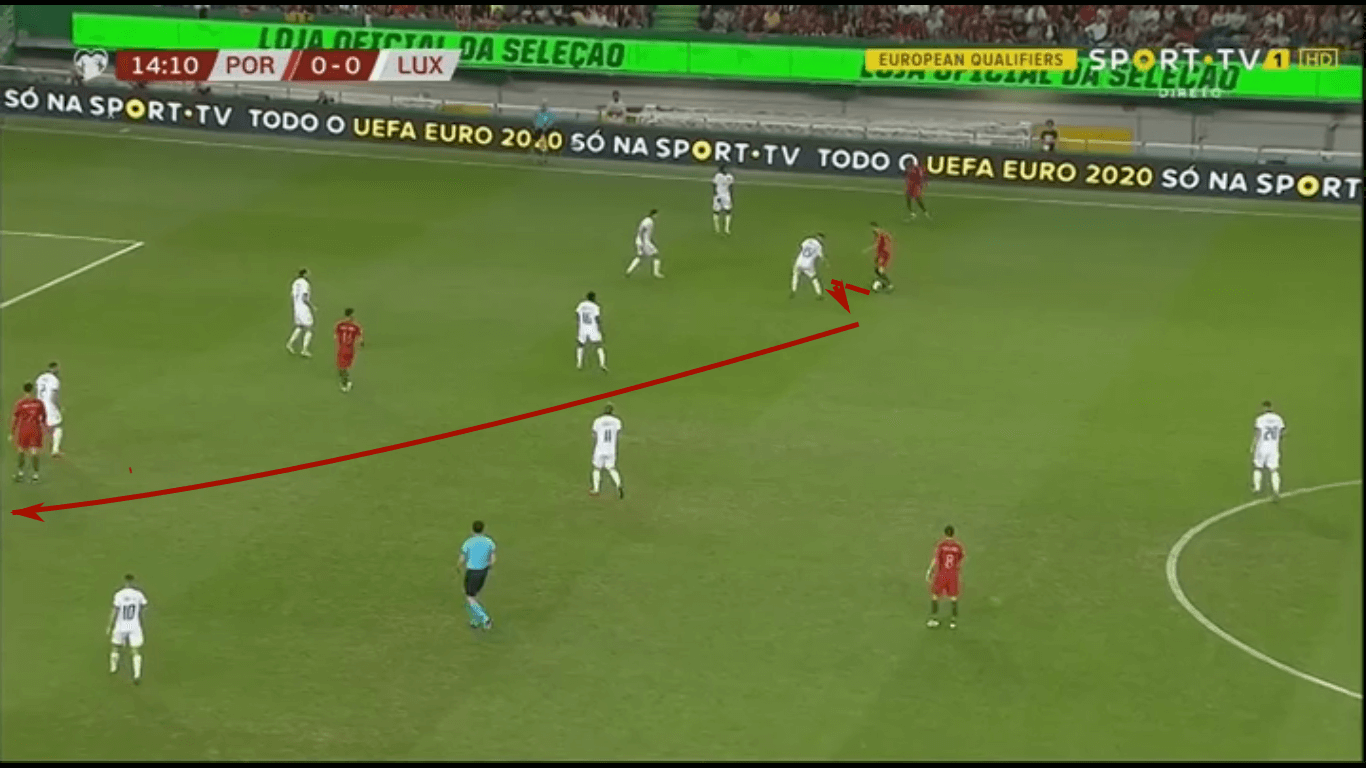
Again with his Portuguese teammates, Fernandes dribbles into the right half-space, committing the defence to the wing. Ricardo Pereira is ready to run, further influencing the defence’s movement. Just as they fully commit to defending the wing, Fernandes cuts back to the middle and sends a perfect 35-metre curler with his left foot.
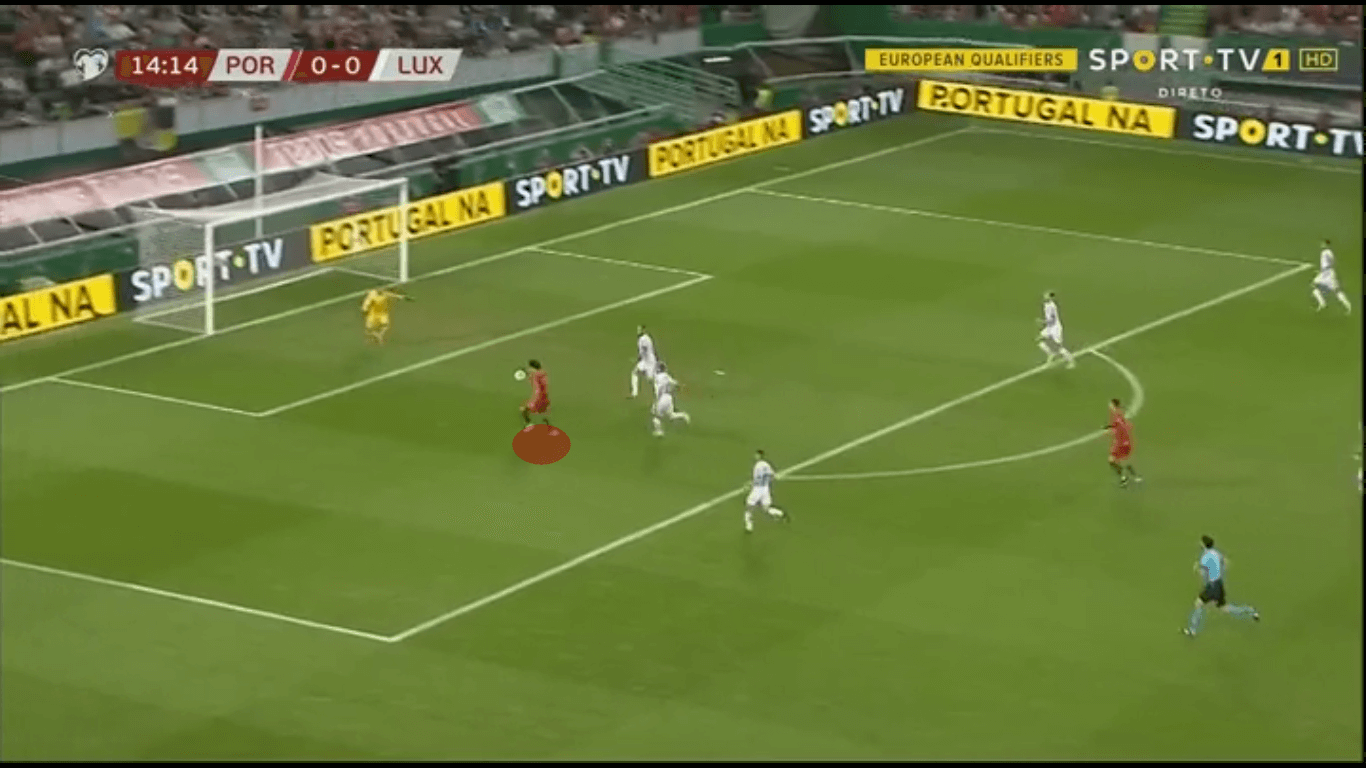
Atlético Madrid wonderkid Joao Felix made the untracked run behind the backline. Fernandes’ misdirection creates space for his teammate and a high-quality chance results from the key pass.
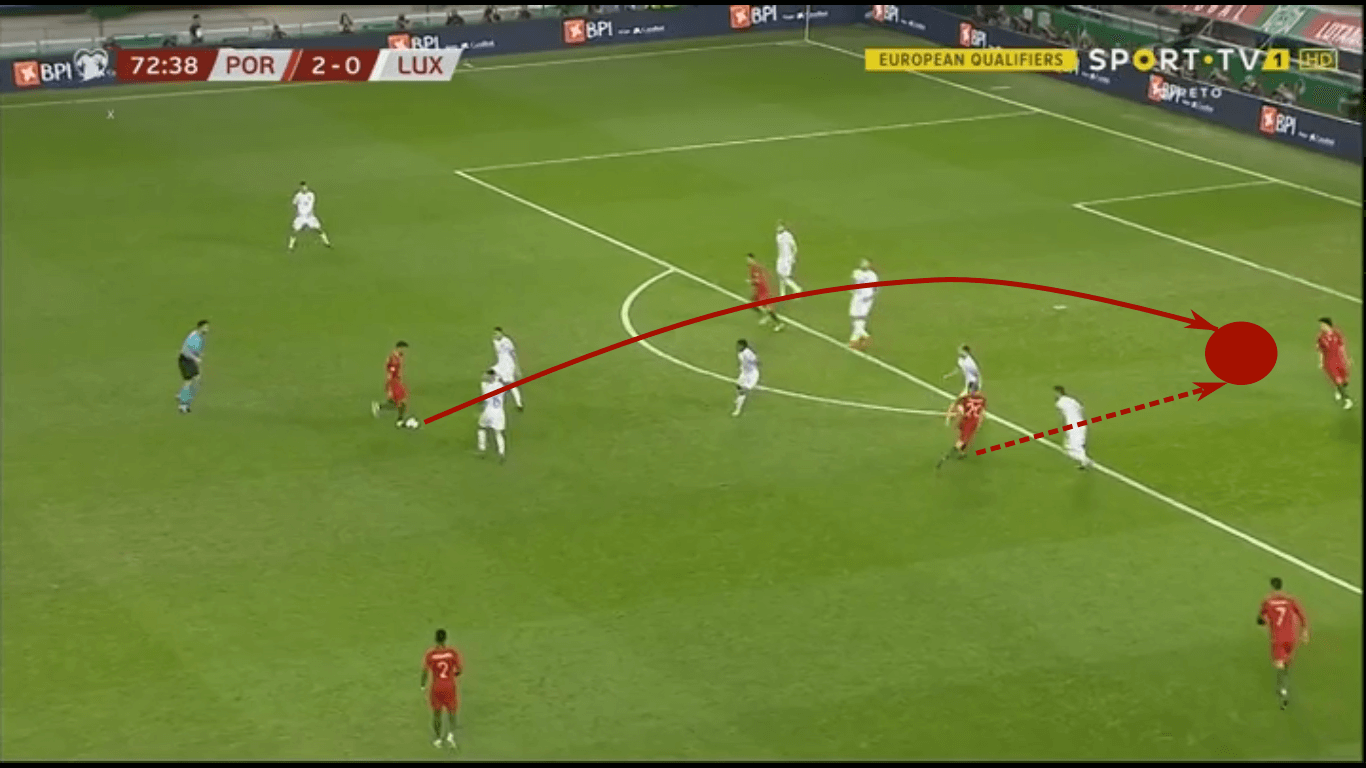
Finally, sticking with the game against Luxembourg, Fernandes shows his chemistry with another world-class Portugueseinternational in Bernardo Silva. Much like his pass to Ronaldo, Fernandes steps outside of the play, occupying a better space to create time and stretch the compact Luxembourg defence. Bernardo makes his run in the 3/5 gap, collects the ball on his chest and flashes the shot just wide. Like 133 his superstar teammates, Bernardo directly benefits from the composure, intelligence and technical skill of Fernandes.
Breaking Lines
One of Fernandes’ greatest assets is his passing range. Comfortable dropping deep to support the build-up, if he can find a pocket of space to buy time for a long-range pass, his range is unlimited. When he and Martins played together for Sporting, it was common to see Fernandes drive accurate long-range passes to his pacey teammate. Gonçalo Guedes and Pizzi reap the benefits of his range when they join sides for the national team.
That range and his ability to use a variety of techniques to answer the conditions before him makes Fernandes especially valuable in progressing play. He’s one of the global leaders in smart and key passes per game.
In addition to playing over the lines, he has the vision to play through them. Whether he’s pinging, bending or driving a low pass, his awareness of angles and ability to create a lane when necessary are world-class. If anything, he occasionally misses his target because they’ve given up on their runs believing the window to receive is too tight. Even when participating in the build-up with simple passes, Fernandes is the type of player who’s always looking for the high-reward delivery that breaks the defence’s lines.
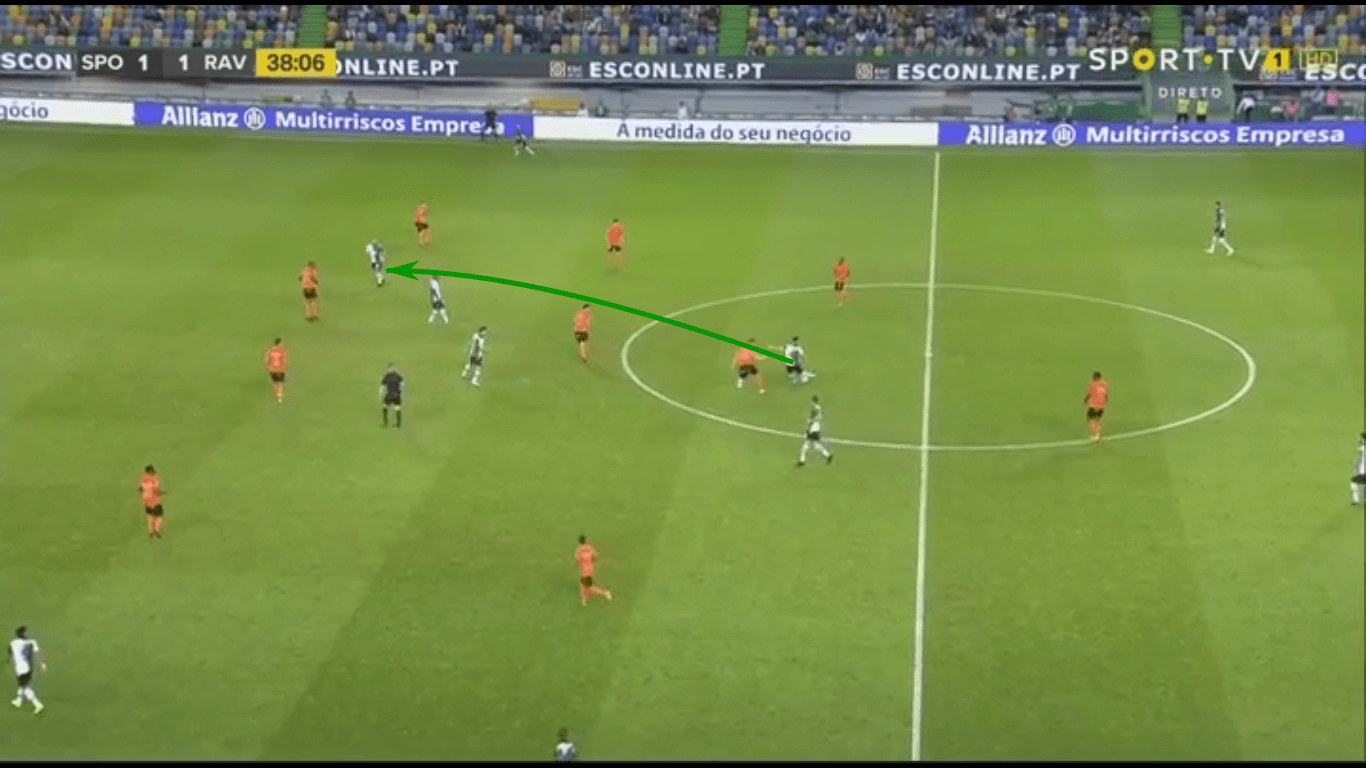
This is a great example of Fernandes’ vision and ability to break lines. He didn’t have many options, with only maybe a negative pass to his right centre-back, a bent ball to his streaking outside-back or a pull-back leading to a square pass. Instead, he locates three teammates in a central position against the two Rio Ave central defenders. In a difficult situation, he has the technical skill to bend a firm pass to his forward, breaking two lines and giving Sporting a central 3v2 as they entered the final third.
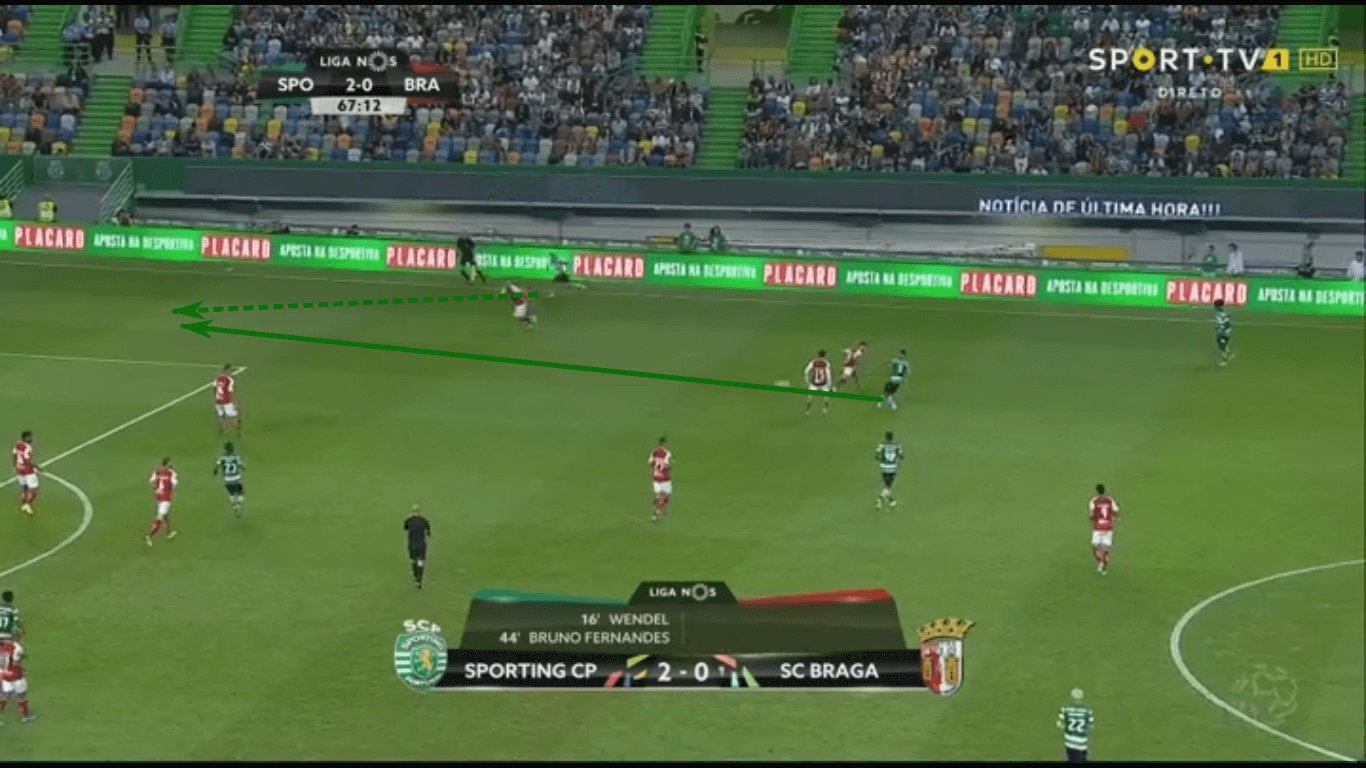
Of the highlighted examples, this is easily the simplest case of Fernandes’ ability to break lines. That said, it’s also a perfect example of his touch. While Fernandes is busy pinning the Braga midfield, Abdoulay Diaby starts his run into the 3/5 gap.
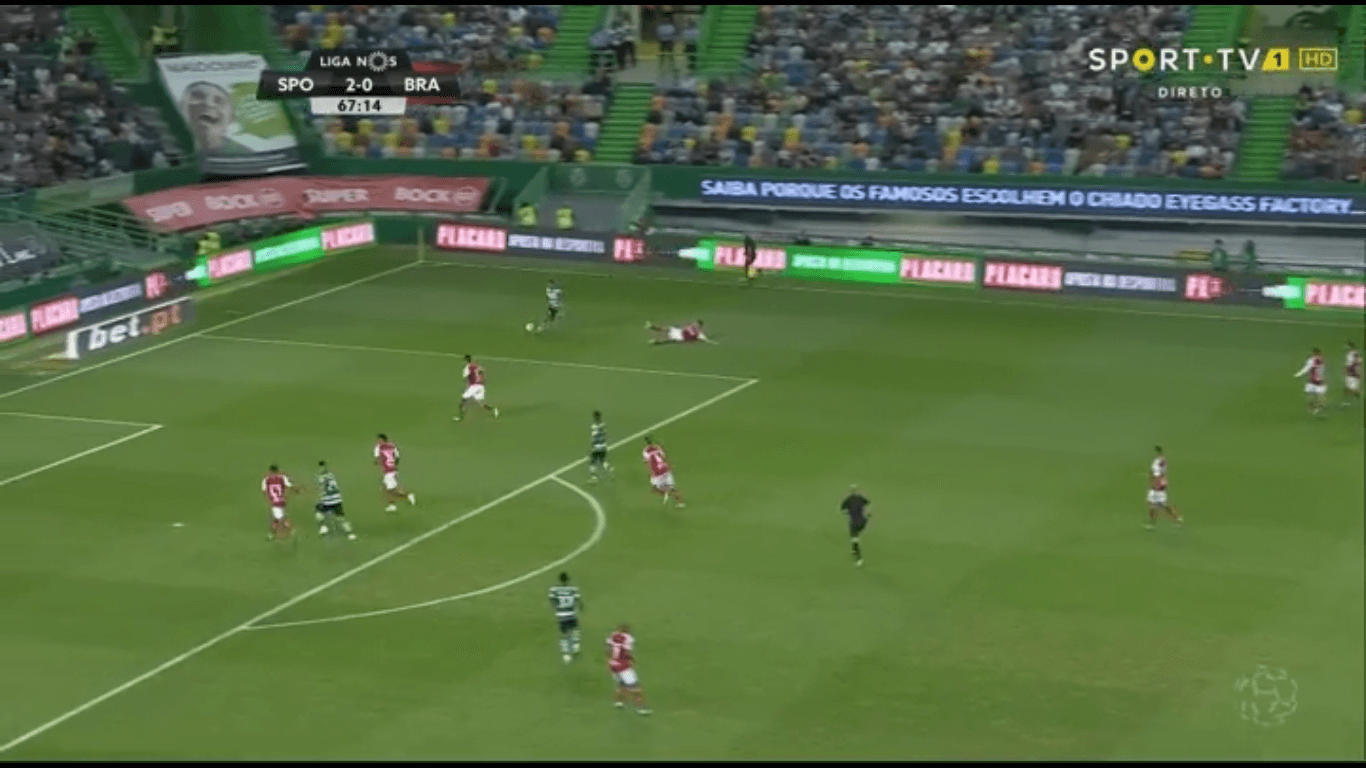
The delivery is picture-perfect. Diaby is able to turn the corner on Nuno Sequeira. The delivery gives the Braga defender just enough hope to attempt a sliding interception, which ensures Diaby has the space to run at the next defender.

This example of Fernandes’ ability to pick apart the defence is so impressive it needs two pictures. In fact, a second picture is necessary because his target is nowhere in sight. Raphinha, the pacey winger, is in a race with Matheus on the wings.
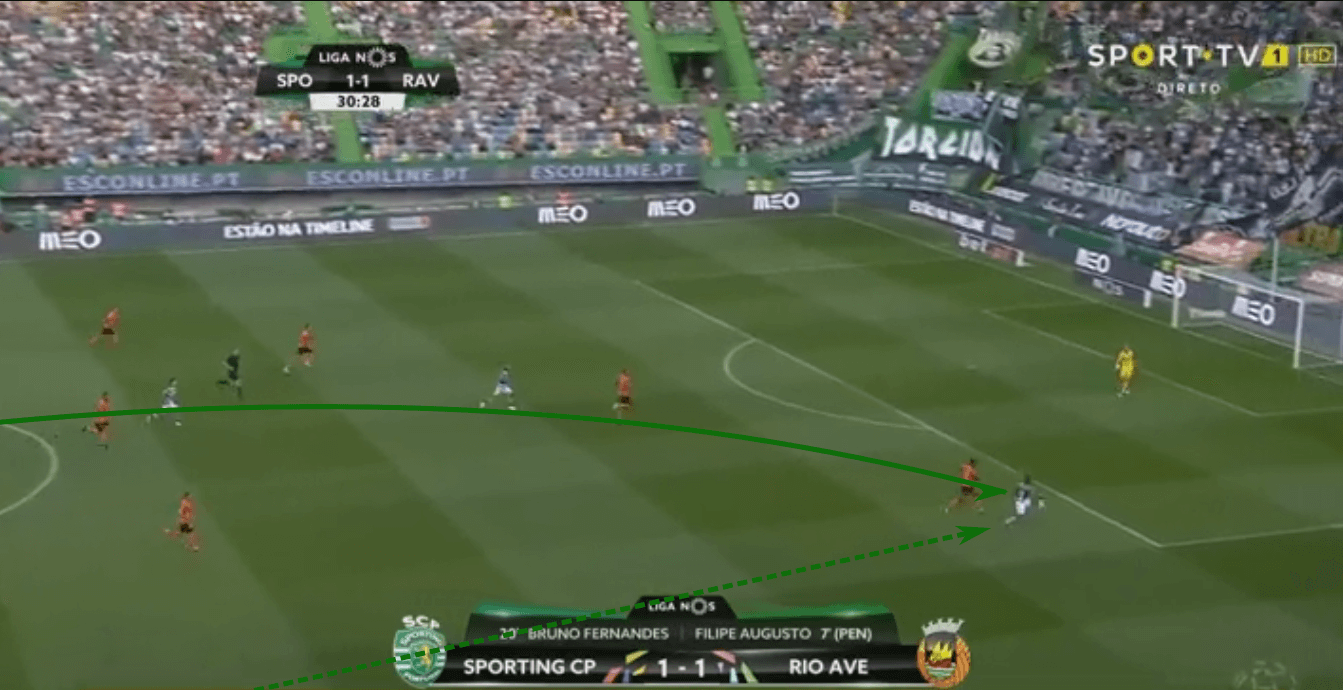
Did you note Fernandes’ striking position? This picture represents Raphinha’s first touch. Fernandes drove a roughly 70-metre pass right to his teammate’s laces.

Finally, back with the Portuguese national team, Fernandes is in a tight spot on the wings. In this situation, most players will put a boot on the ball and play negative. The only problem is that Fernandes already has his target. Plus, even though the pass would require a perfectly bent ball through a tight lane, it’s no problem for Fernandes. He swings it right through the defence, bypassing four players.
Runs from deep lead to finishing
Unlike most playmaking midfielders, Fernandes is a lethal finisher. At the time of writing, Sporting has played 11 league games in the 2019/20 season, scoring 18 goals. Fernandes has played in 10 of those games, recording five goals and five assists, directly influencing 56% of Sporting’s goals.
As Sporting and Portugal become more secure in possession, he’ll look to move higher up the pitch, offering a line-breaking pass and positioning himself to attack a weakness in the defence. If he’s able to receive between the lines, he’ll run at the backline, pinning them back. If the defence plays off of him, looking to delay Fernandes attack while taking away his teammates, he has the instincts to force a response from the defence. If they don’t step to him or only send one unsupported defender, Fernandes will look to find a shooting lane and punish the defence. If they send a defender to pressure Fernandes and adequately cover against the dribble, he’ll find the vulnerability or error in movement and play a dangerous ball to a teammate.
As the Portuguese Primeira Liga has learned, you pick your poison when Fernandes is running at you.
While Fernandes owns a lethal shot, he deserves credit for his starting points and movement off the ball. He’s the type of player who creates his own chances by constantly analysing the defence’s structure and picking out their weaknesses. At a bigger club with a team that plays at a comparable level to Portugal, Fernandes has the potential to not only rack up assists, but also take advantage of the attention given to the forwards ahead of him. Think of the attention Harry Kane and Marcus Rashford demand. Fernandes would benefit from the additional space afforded by the presence of a marquee forward. With that extra time and space, expect him to consistently make runs from deep to earn finishing opportunities. Take a look at a recent example.

Just a moment ago, you saw a sequence in which Bernardo received a beautiful chip from Fernandes. Now Silva returns the favour. After dropping deep to develop the play, Bernardo holds the ball as Luxembourg settle into a ¾ line of confrontation. Fernandes takes a look at Ronaldo, who’s commanding the attention of the two centre-backs. Luxembourg is vertically compact with approximately 25 metres 135 between the defenders and forwards. As the defenders anticipate a ball played to Ronaldo’s feet, Fernandes starts his run into the space the centre-backs vacated.
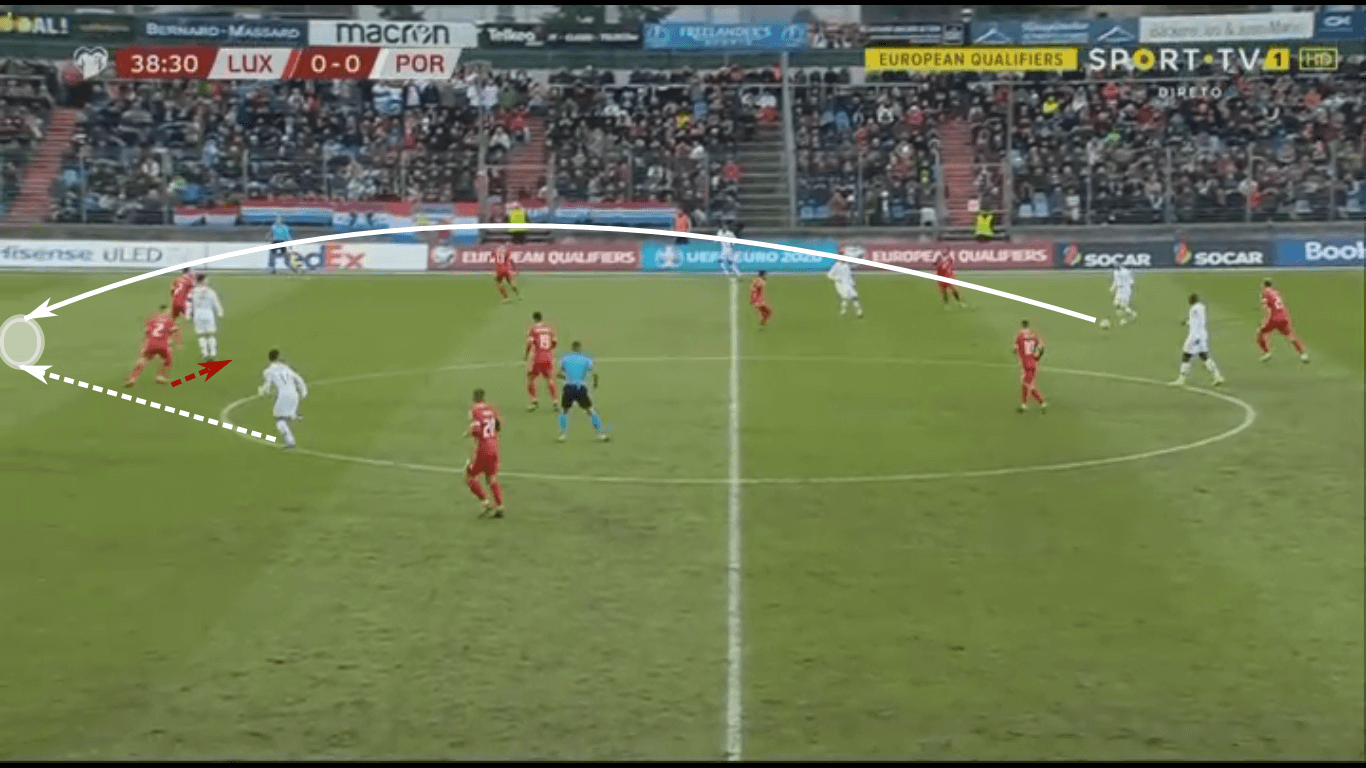
At this point in the play, you figure the scoreboard operators had already credited Fernandes with the goal. As Maxime Chanot shifts his momentum towards Ronaldo, Fernandes hits fifth gear, racing to Bernardo’s flighted ball to collect his game-winning goal, securing Portugal’s EURO 2020 berth.
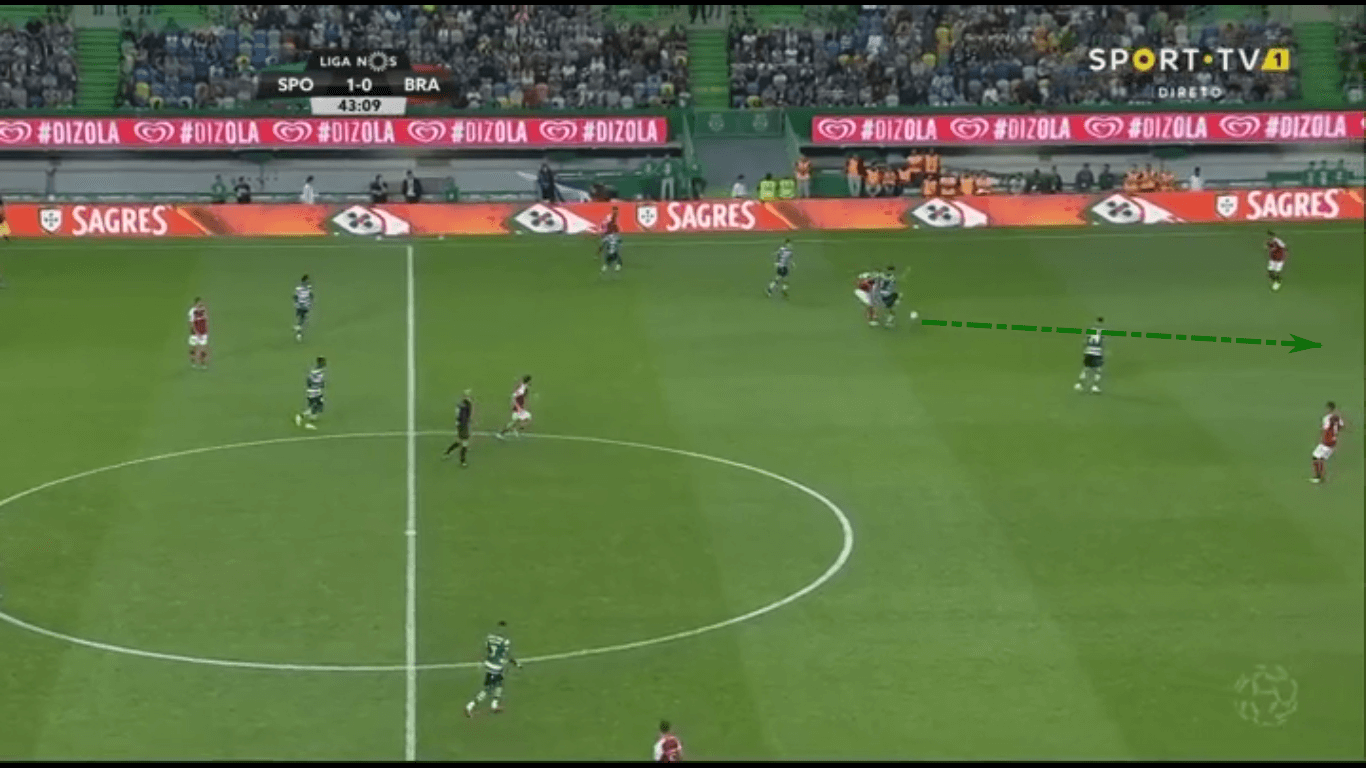
In a transitional moment, Fernandes wins a tackle near midfield and races on towards goal as Sporting and Braga engage in a 3v3 duel.
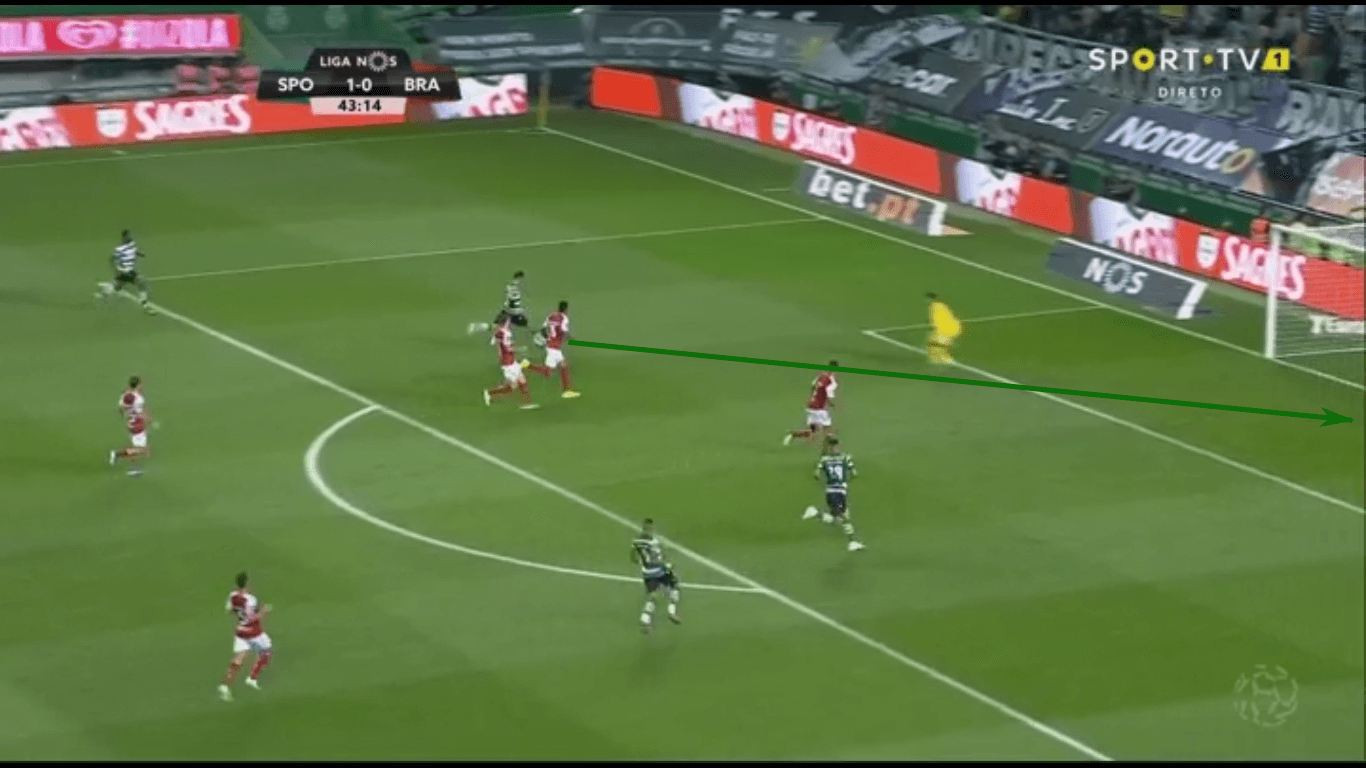
He gets the centre-back, Bruno Viana, to bite on a feint to the inside, then cuts to his left. In typically Fernandes fashion, it’s a blistering shot with extraordinary precision that beats the goalkeeper.
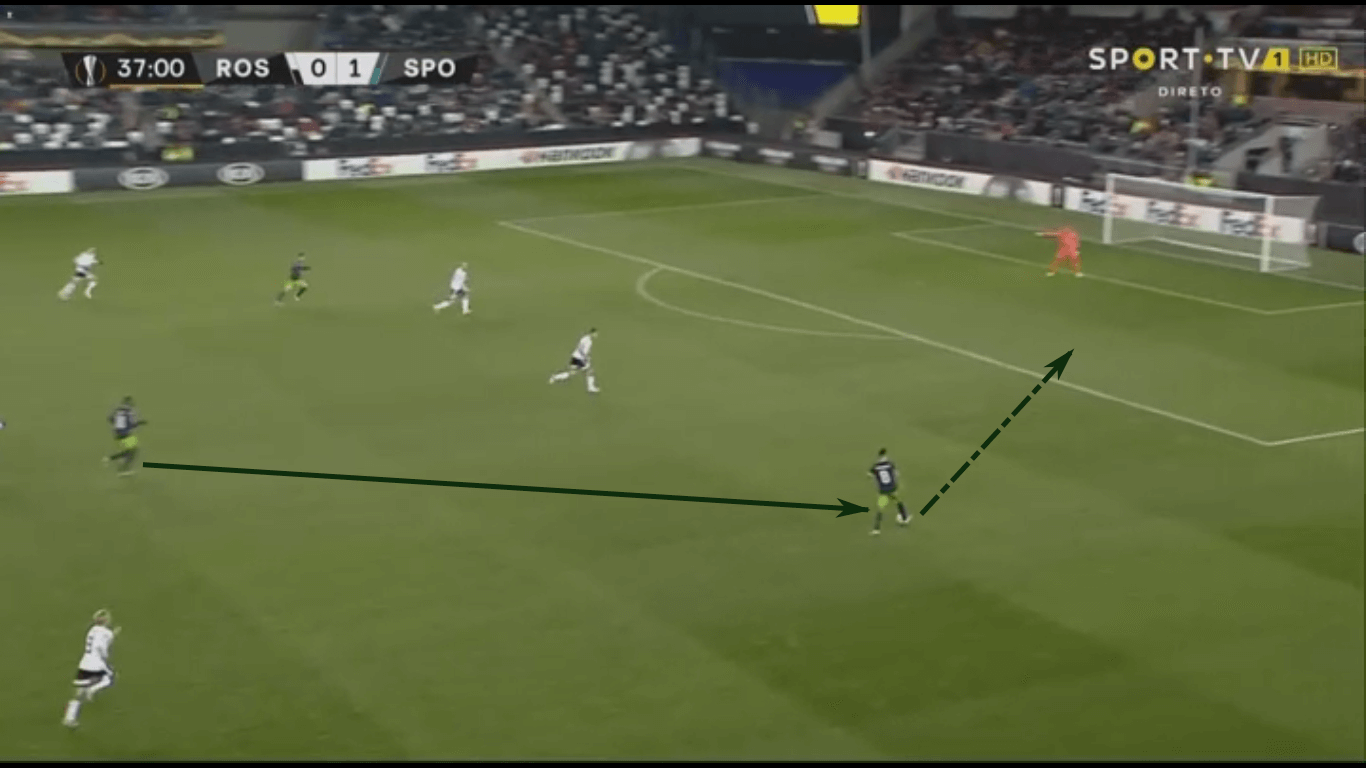
Finally, we turn to Europa League action. After a Fernandes shot is saved, Rosenberg quickly restarts the attack. Sporting defensive midfielder Idrissa Doumbia intercepts a pass near midfield and immediately sends the ball to Fernandes, who’s alone on the wing. After a few touches towards goal, Fernandes gets Even Hovland to attempt a block from Fernandes’ right foot.
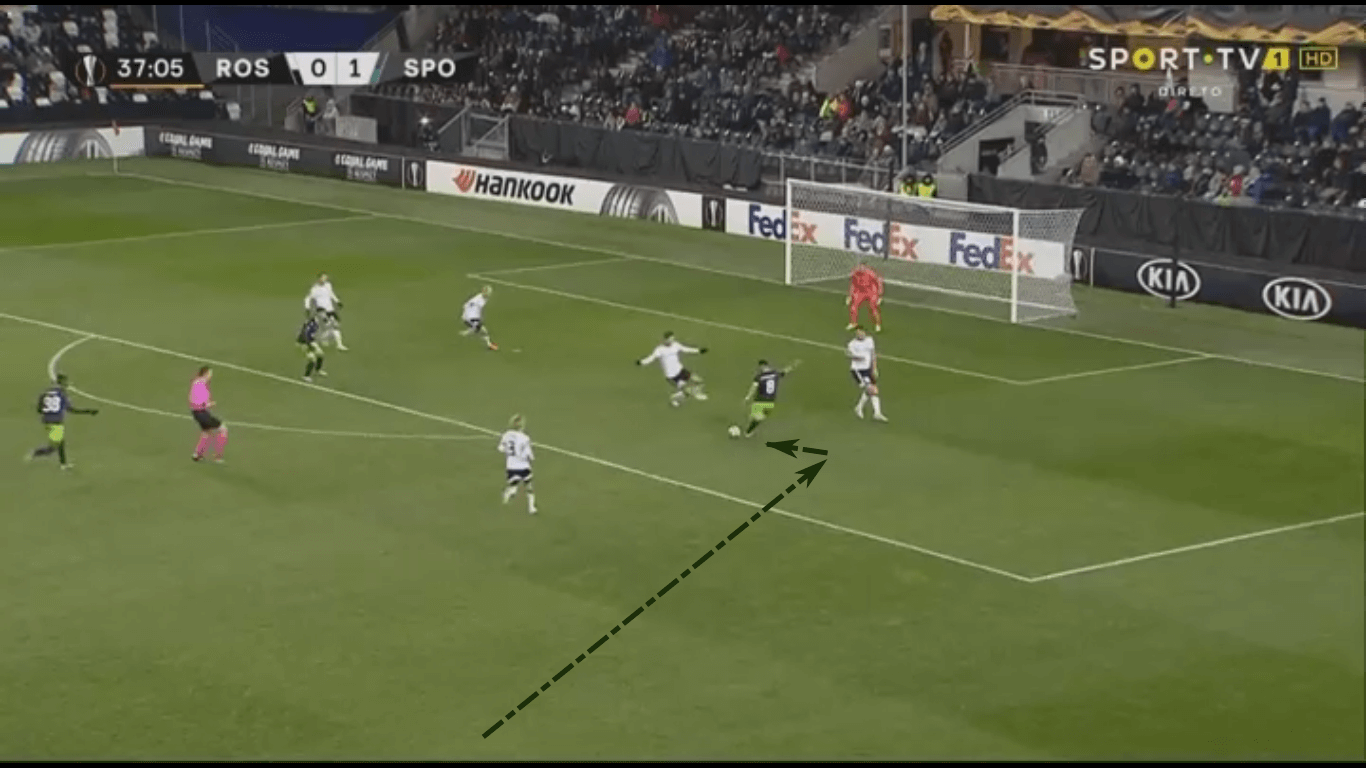
As the centre-back lunges out wide and turns his head, Fernandes calmly cuts back to his left and blasts the ball past Andre Hansen with his non-dominant left foot.
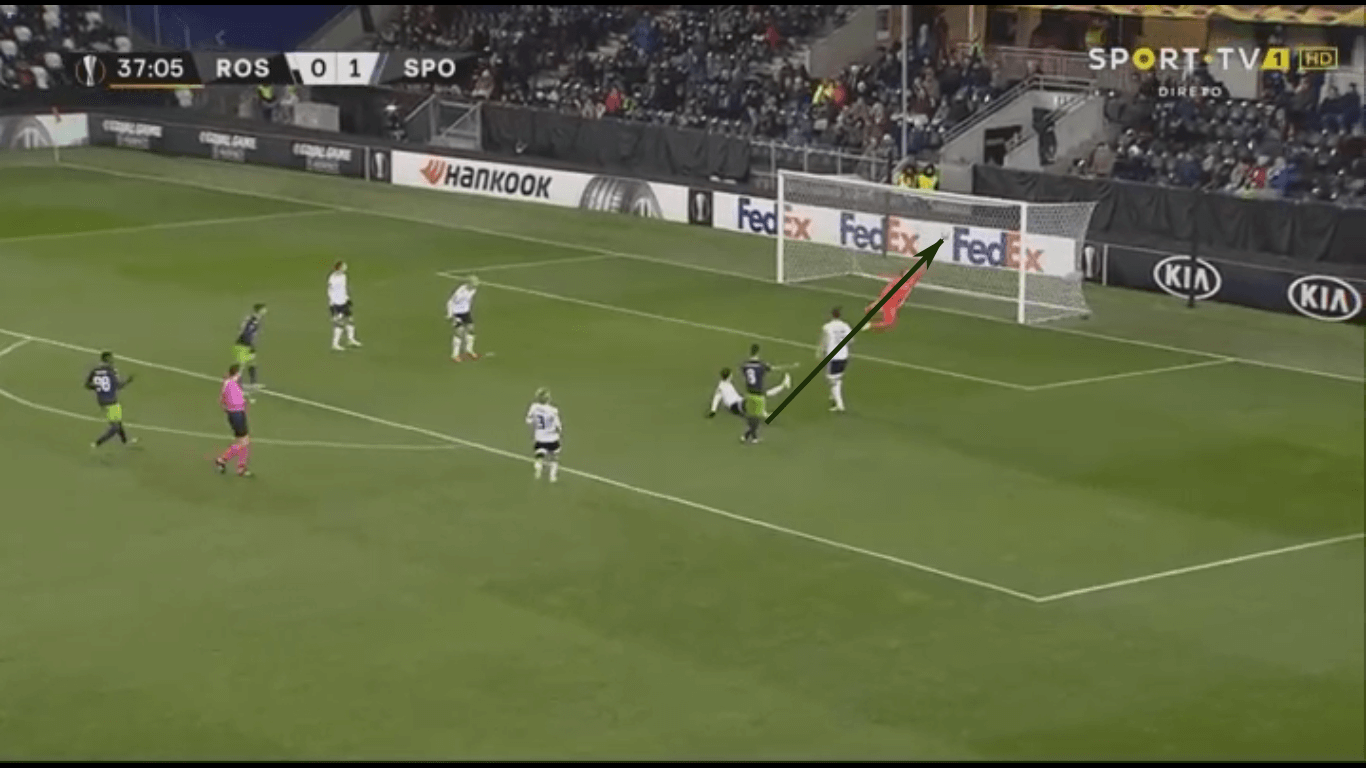
Look at the image to gauge the power and precision of the shot. The ball is beyond the diving Hanson and well out of his reach as he attempts to make the save.
Why Manchester United Needs Fernandes
Though Manchester United scouts cited concern about Fernandes’ low passing percentage, they should also note that the current team is successful on a mere 37.9% of the smart passes they attempt. Wyscout defines a smart pass as “A pass that develops the attack of the team in a creative way.” Aside from Pogba, the team doesn’t have a consistent playmaker in the midfield. Having a high pass completion percentage is significantly easier when you’re attempting a low number of smart passes.
That said, you won’t write home about the pass completion percentages in the Manchester squad. Among the midfielders, Fred leads the team at 86.1, Juan Mata is second at 83.4% and Pogba takes the bronze with a mark of 80.7%. Scott McTominay owns a 78.9% success rate and Pereira brings up the rear at 73.3%.
Key passes is another metric in which Manchester United are really struggling. Opta defines a key pass as “the final pass or pass-cum-shot leading to the recipient of the ball having an attempt at goal without scoring.” It was noted that Fernandes averages 3.5 key passes albeit in the Portuguese Primeira Liga. After Pogba’s team-high of 2.6 key passes per game, Andreas Pereira places second among United midfielders with a mark of 1.4 per game.
With Pogba recovering from an injury, the lack of creativity and incisiveness is evident. With all the talk about Fernandes’ passing completion rate being too low for United’s style of play, the current squad shows neither the high passing success rate that comes from patient build-ups nor the smart or key pass marks that follow aggressive attacking teams. If Fernandes doesn’t fit the club’s identity, then, given their abysmal stats in most passing categories, maybe the better question to start with is “what is the post-Sir Alex identity?” United need to answer that question before making a final judgement on Fernandes. Given their struggles to create from the midfield, he certainly seems to fit a gaping need.
Why Tottenham Needs Fernandes
With Mauricio Pochettino out the door and Mourinho taking the helm at Tottenham, Spurs might finally have the pieces in play to get its man. During the summer, Spurs summer 2019 bid of €45 million (plus €20m in bonuses for winning the Premier League and the Champions League) would have left the debtheavy Portuguese side with just €12 million due to a 2018 financial restructuring. The financial price for the on-field cost simply didn’t add up for the Portuguese.
Enter a struggling Tottenham side, a powerful new coach and his super-agent Jorge Mendes. That original price tag doesn’t look so bad now. Add in the claims that Mendes was brought in to help facilitate Fernandes’ move to Manchester United and you’ve got an agent with the inside scope on the possibility of a transfer.
Mourinho is very high on the player, whom Transfermarkt rates as the sixth most valuable attacking midfielder. Mourinho is on the record as saying,
“I was surprised by the season of Bruno Fernandes. It was easy to predict quality, he is a very good player, but scored a very high number of goals for a midfield player. It shows that you need to have instinct and qualities to score and he has it all. He strikes the ball well, heads well, cool when he is one-on-one with the goalkeeper. He finds space in the penalty area. It’s all there.”
This Tottenham side needs an injection of life. Plus, Mourinho would love to get one over on United. Beating them to Fernandes’ signature would assist his psychological recovery from his time at Old Trafford.
From a numbers perspective, the transfer would suit Tottenham well. Erik Lamela’s 1.6 key passes per game lead the team. No other player averages 1.5 per game. Through the first 137 12 games of the season, Son Heung-min was the only Spur with more than one assist (3) and he led the team with a 1.8 xA. With Christian Eriksen heading for the exit, Fernandes seems the natural successor in London.
Conclusion
Through an in-depth analysis, we see Fernandes top assets are his vision to break lines, set teammates in on goal with key passes and create his own finishes with runs from deep. Though some scoff at his numbers, claiming they’re inflated by the level of competition of the Portuguese league, it remains one of the top developmental leagues in the world. Few leagues can match the high number of top-end players the Liga NOS has produced in the past couple of decades.
Additionally, Fernandes has showcased comparable ability and production with Portugal in 2019. His confidence and chemistry with his teammates are growing, keeping his name on Santos’ lineup sheet. Given the talent on the Portuguese national team, we have a glimpse of what Fernandes can bring to Europe’s elite clubs.
Neither Manchester United nor Tottenham can afford to lose out on Fernandes. He fills an incredibly obvious need for each team and would inject creativity, flair and vision into their stale attacks. As much as Sporting would love to hold onto their captain, their debt burden will surely force them to sell, possibly as early as January. Expect the two English sides to battle for his services. In the end, I predict that Mourinho’s influence will win the day and Fernandes will sign with Spurs.

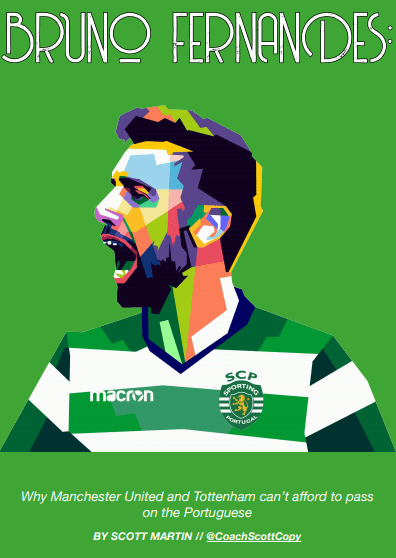
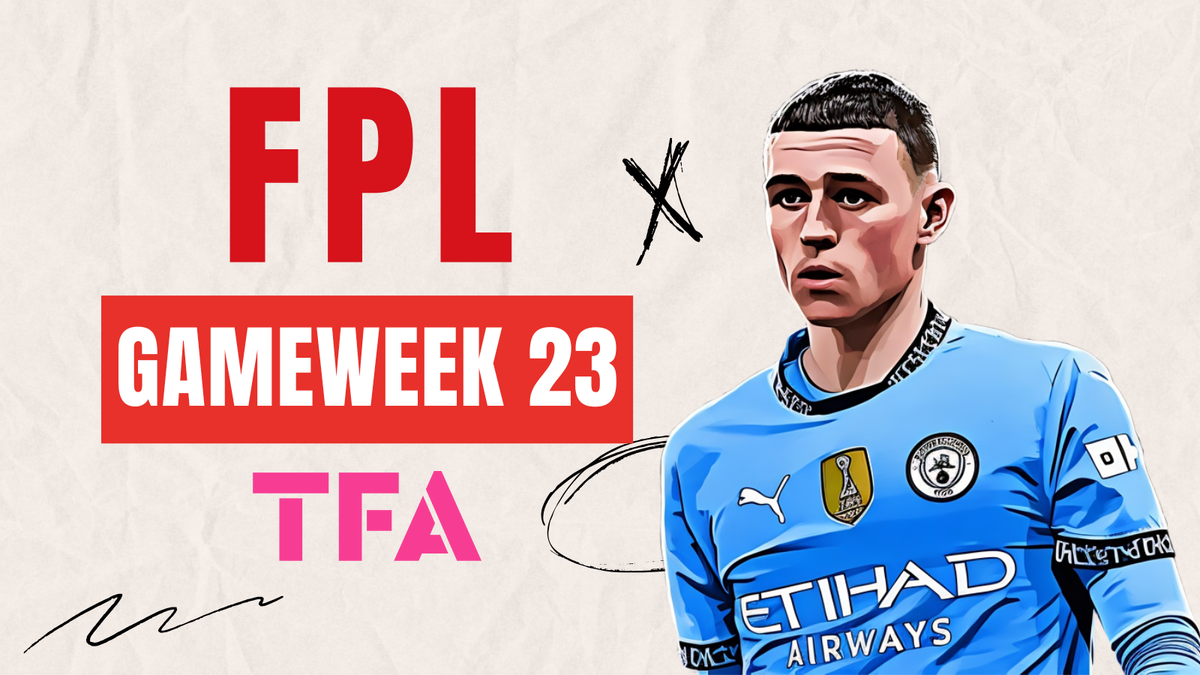
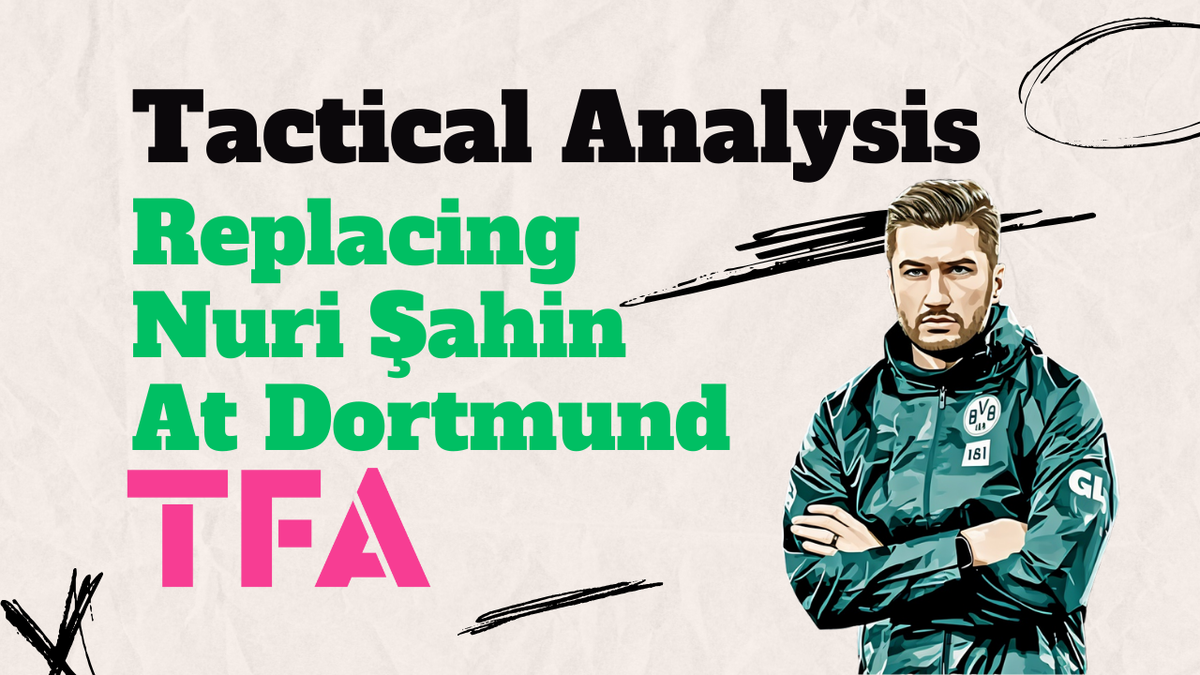
Comments